Send Transaction Notification
Note: We recommend that you automate this manual process using the API.
Use Case
Click the Send Transaction Notification button when your customer is the
originator of the transaction. This will notify your counterparty VASP about
the transaction, including all required Travel Rule data. Depending on the
counterparty VASP, 21 Travel Rule will automatically pick TRP or email to send
the notification.
For email notifications, the presence of the transaction ID will determine whether the email will contain a request to the counterparty to confirm the correctness of the beneficiary details. Upon which you will proceed in executing the transaction on the blockchain. This is typically used when the beneficiary details are provided by your customer. See below for more details.

Step-by-step Guide
Clicking the Send Transaction Notification button will prompt a three-stage
form pop-up consisting of:
1. Beneficiary Information
The Beneficiary Information step of the form will show two options depending on the protocol the counterparty VASP uses.
TRP
If a valid Travel Address is provided by your counterparty VASP this means you can use the TRP protocol.
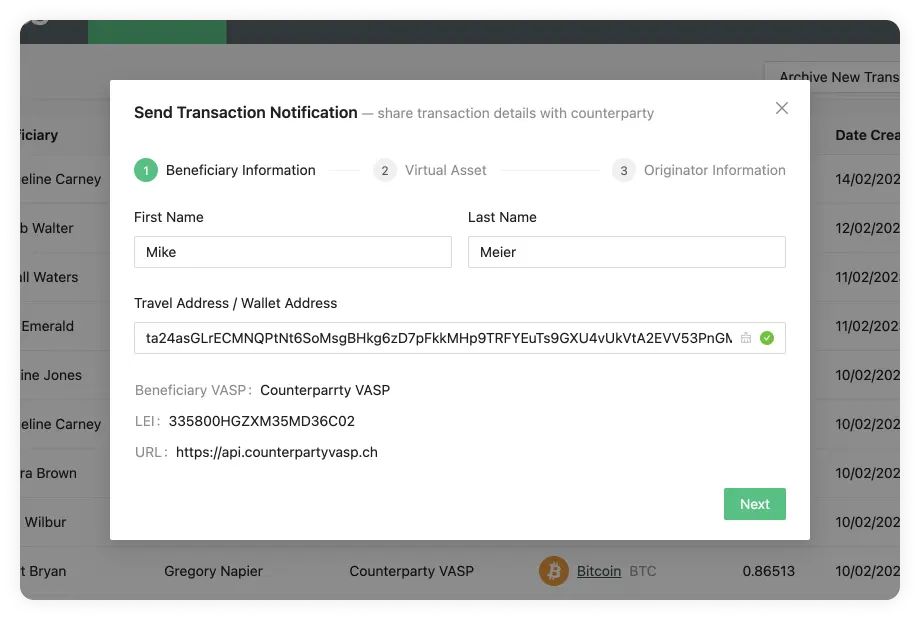
First Name
If a Travel Address is used, the first name must be the one associated with the Travel Address.
Last Name
If a Travel Address is used, the last name must be the one associated with the Travel Address.
Travel Address
The Counterparty VASP must provide the Travel Address. This Travel Address contains information about the customer of the Counterparty VASP that wishes to conduct the transaction. If this is introduced correctly, 21 Travel Rule will infer which counterparty VASP data the Travel Address is associated with.
If a VASP does not have TRP as a fallback, email can be used. To use this protocol, you can simply add a Wallet Address instead of a Travel Address.
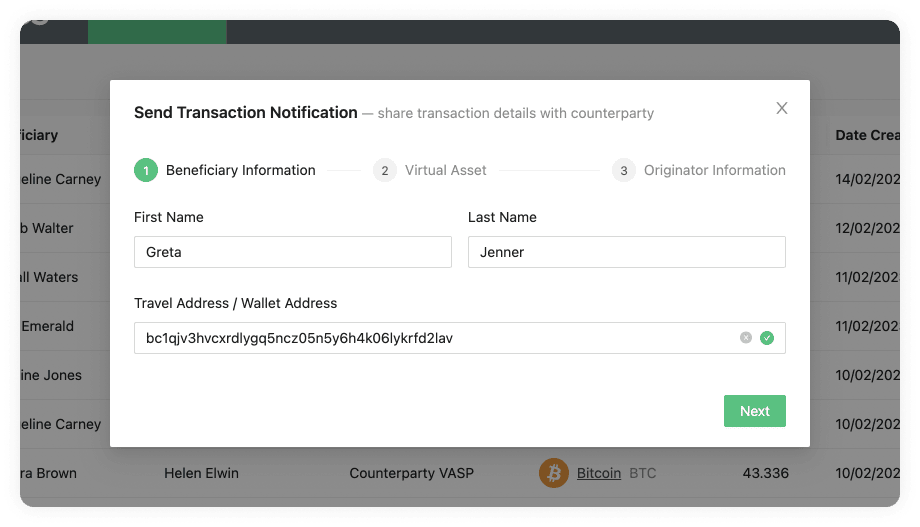
First Name
The first name of the customer who owns the Wallet Address.
Last Name
The last name of the customer who owns the Wallet Address.
Wallet Address
A Wallet Address with the correct format for any of our supported virtual assets.
2. Virtual Asset
This step will show different fields depending on your chosen protocol in the Beneficiary Information step. You will see the following fields on both flows:
Virtual Asset
Here you can find a list of all the assets we support. 21 Travel Rule supports the complete list of ISO24165 DTIs (Digital Token Identifiers). If you can't find an asset, you can always contact 21 Analytics and request to add an asset. You should choose the virtual asset used in the transaction.
Amount
The amount of the virtual asset selected for the transaction.
TRP
If you are using the TRP protocol, you will now see the second step of the form:
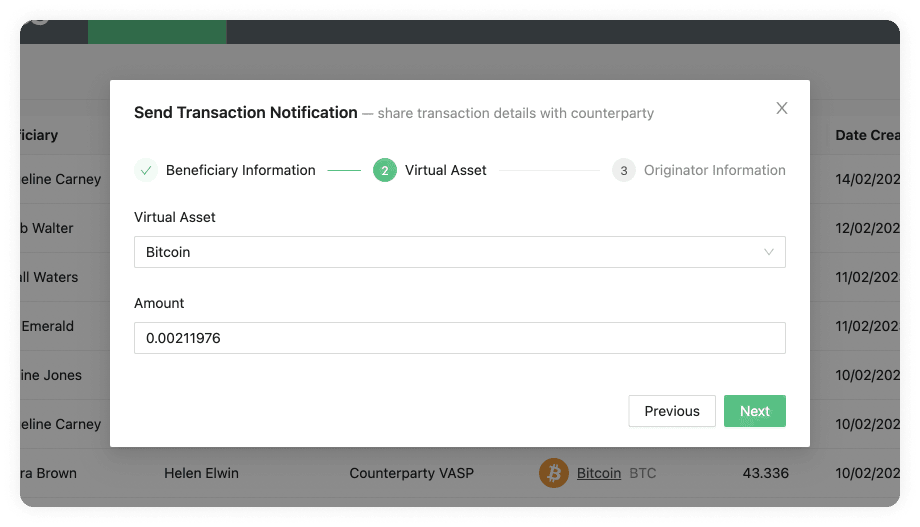
If you are using the Email protocol, you will now see the second step of the form:
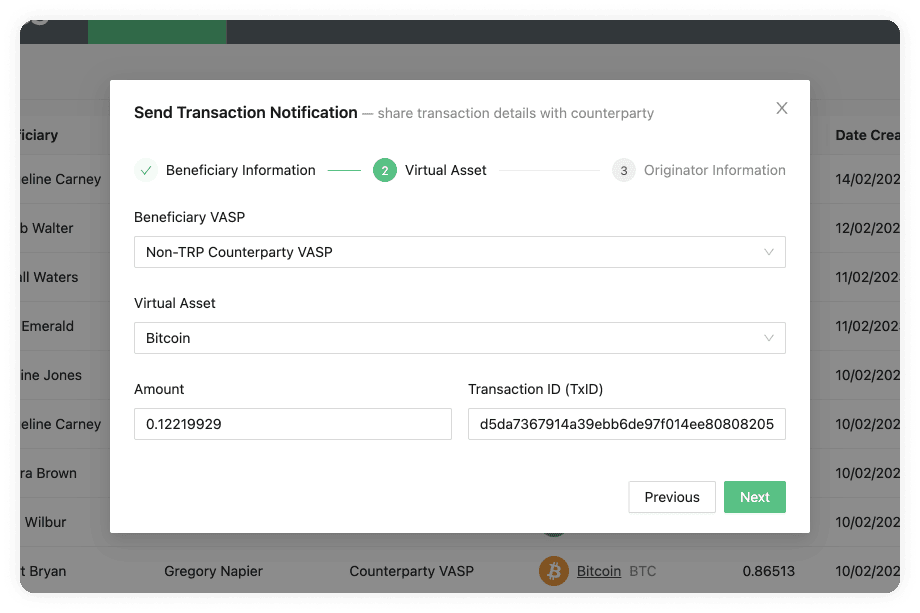
This has some additional fields apart from Virtual Asset and Amount; these are:
Beneficiary VASP
A choice of trusted counterparty VASPs maintained at Counterparty VASPs. You should choose the VASP the beneficiary has an account with.
Transaction ID (TxID) (optional)
A virtual asset transaction will create a Transaction ID for this particular transaction in the blockchain. You can usually find these either on your wallet or on a blockchain explorer.
Since this field is optional, there are two possible contents that are sent in the email notification:
- By adding the TxID, a blockchain transaction must be executed beforehand (hence, we have a TxID) and the counterparty VASP will be informed about the corresponding Travel Rule data.
- Leaving the field empty, the Travel Rule data is sent before the blockchain transaction (hence, we don't know the TxID) and the blockchain transaction must be executed only after the counterparty has confirmed the validity of the data.
3. Originator Information
The third and last step of the form is the Originator Information.
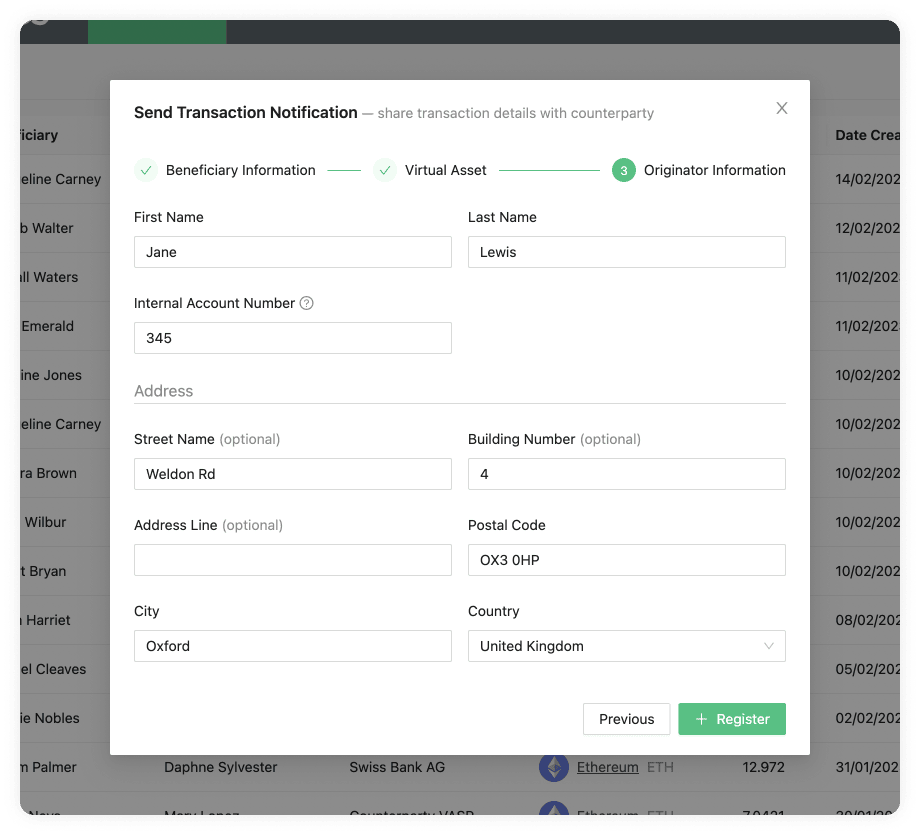
Here you will find the following steps:
First Name
The first name of the originator customer of your VASP.
Last Name
The last name of the originator customer of your VASP.
Internal Account Number
A number used to identify your customer within your system. This can be mapped to an external custodial system. Each customer should have a unique Account Number.
Street Name (optional)
The name of the street the originator customer of your VASP resides at on their ID. This is optional unless you are using TRP. If TRP is used, either this field or Address Line is required, as well as the Building Number.
Building Number (optional)
The building number on either the street or address in which the originator customer of your VASP resides at on their ID. This is optional unless using the TRP flow. This would be required alongside either the Street Name or Address Line fields.
Address Line (optional)
The Address Line where the originator customer of your VASP resides, as shown on their passport or ID. This is optional unless using the TRP flow. If TRP is used, either this field or Street Name is required, as well as the Building Number.
Postal Code
The postal code of the originator customer of your VASP. This postal code is tied to the address on the customer's passport or national ID.
City
City where the originator customer resides.
Country
Country where the originator customer resides.